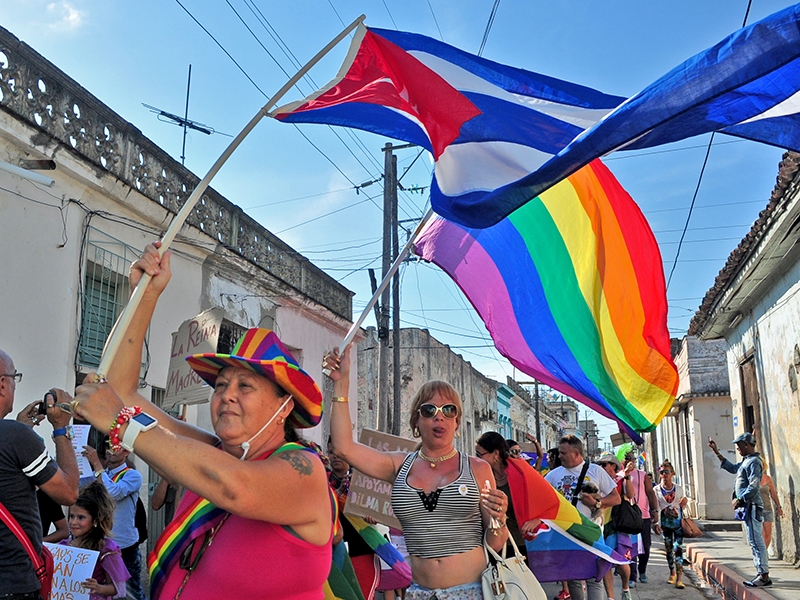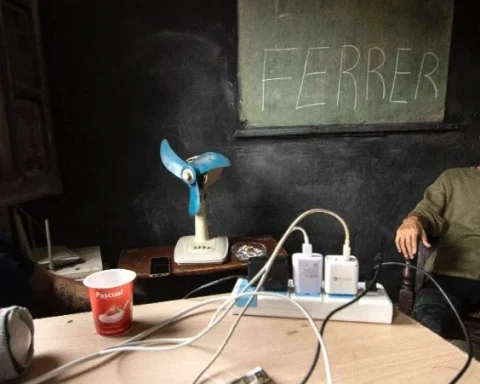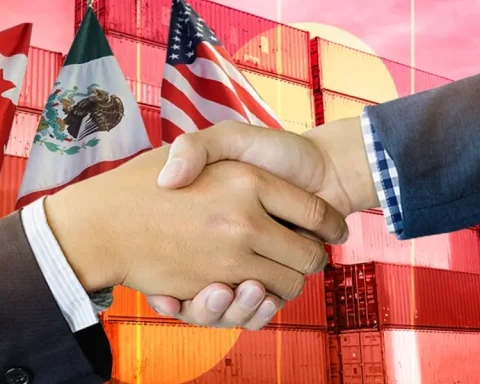MEXICO CITY.- With the intention of updating the Family Code, the Cuban government will submit its proposal to a referendum. This would make the island the only country in the Americas to submit rights such as same-sex marriage to a popular vote.
That same-sex couples can marry and thereby access the same rights conferred on heterosexual people, including adoption, assisted reproduction as well as legal guarantees, has been one of the oldest demands of the LGBTIQ + community in the world. In Latin America, 10 countries already recognize the right to same-sex marriage, and one (bolivia) accepted the civil union in December 2019.
Cuba, if the majority of the votes are obtained, would be the twelfth country to legislate in this regard. A fact that, although it would constitute an achievement for sexual dissidence, should not have to be put to the vote. The human rights (DH) no plebisciten. Doing so runs the risk of majorities crushing minorities and denying them rights that correspond to them by the simple fact of being born human beings.
In a majority white country, it should not be subject to a popular vote that people of another race or ethnic group have access to the same services, for example. Nor should men decide whether women deserve to vote, drive a car, or work. Let’s think that in a referendum 100 percent of the voters choose to legalize torture, would it be legitimate? No, the role that states must play in these cases is to guarantee and respect rights, not subject them to popular judgment, as the Cuban government is doing.
If we review how these regulations have been approved on the continent, no other country had committed such a blunder. In 2005 Canada he was the first in America (and the first outside of Europe) to pass same-sex marriage nationwide. In the North American country, it was not submitted to a referendum, nor in those that supported it: Mexico (26 of 32 states have it regulated), USA, Argentina, Brazil, Uruguay, Colombia, Ecuador, Costa Rica, Chili. Simply the Parliaments of these countries or their courts ruled that this right would be for all people.
Of course not everything was a bed of roses and it was mediated by the contexts of each nation, with lesser or greater resistance. In Uruguay (the second country in Latin America to legalize it throughout its territory) the Law was approved with the vote in favor of 71 of the 92 parliamentarians present.
In Ecuador it was not so simple. In 2019, its highest constitutional body backed same-sex marriage in a vote that is considered historic in the country: five votes in favor and four against.
To date, only a third of the nations that make up the continent have taken this step. In Paraguay and Honduras they adopted laws that expressly prohibit same-sex marriage. Even that in the Anglophone Caribbean nine nations still consider consensual homosexual acts between adults as illegal. But since 2013 it can be seen that more regions have been interested in legislating in favor of the LGBTIQ+ community. Which is seen favorably by international organizations that promote human rights. In fact, the Advisory Opinion number 24 of the Inter-American Court of Human Rights (IACHR) pointed out in 2017 that “it is the obligation of the states to recognize the family ties of people of the same sex and protect them.”
A positive score in this matter would not hurt Cuba, which is going through one of its worst economic and legitimacy crises, with more than a thousand political prisoners. Nor should we forget that the island must present to CEDAW (The Committee for the Elimination of Discrimination against Women) a report that has been overdue since 2017 and the advances proposed by this text in terms of gender violence will be well received.
Why a referendum?
Although Cuba is not the first country to put equal marriage to a popular vote (it will do so on Sunday, September 25), it is the first to do so unjustifiably.
In the case of Ireland, which in 2015 became the first nation in the world to approve it by popular vote, it was necessary to modify the Constitution to do so. And the Magna Carta could only be altered if the majority of voters said “yes”. As happened on May 5 with 62% of the votes.
Fifteen years later, Switzerland was the second to submit the same right to a plebiscite, but not by government choice. In December 2020 the Swiss Parliament had initially approved same-sex marriage. However, the ultra-conservative Christian Federal Democratic Union party submitted nearly 70,000 signatures against the measure. This triggered the law to be put to a vote at the request of citizens, in compliance with the standards of that European country. Finally, more than 64% chose to recognize the right.
Cuba, which would be the third country to put marriage equality to a referendum, has no justification to do so, as its predecessors did. Which leads to the question that if there really is an intention to approve the rule, why put it to a vote then?
The decision to plebiscite an act, government political measure or legal provision, is exclusive to the National Assembly according to Art. 108 of the Constitution and articles 256 and 265 of the Electoral Law. There is no legal constraint that would stop the Cuban regime from recognizing these human rights, but it chose to subject them to scrutiny.
With this they could seek to give “an appearance of direct democracy, when we know that the word democracy is superfluous in the actions of the island’s rulers. Which is marked by opacity, discretion and the absence of mechanisms that allow popular control and supervision”, says Cubalex lawyer Giselle Camila Morfi.
It is also noteworthy that it is not common for these consultations to be held within a totalitarian system such as Cuba’s.
“It is a very dirty move by the political power in Cuba to refer the Family Code to a referendum,” says activist Daniel Triana. “Let us remember that 63 years ago there is no democratic tradition of any kind and that political decisions are vertical. Suddenly, one of the best prepared documents that have passed through the Assembly, due to its benefits for minorities and historically marginalized sectors, they decided to put it to a vote when they could have approved it with a stroke of the pen as they always do.
For Triana, the instrumentalization and pinkwashing that the government is doing with the Family Code to appear progressive and take advantage of this agenda is also perceptible. “There is a very visible attempt to erase the historical memory of dark decades of the LGBTIQ+ community in Cuba. A wound that is still open.
According to the activist, in his opinion they intend to suppress the past without apologizing for the UMAP, the reconversion techniques, state homophobia. Without acknowledging the openly homophobic statements of Fidel Castro or the homophobic publications of Party organs whose guidelines have been discriminatory. The aim for him is to wipe the slate clean without recognizing the victims.
Vote yes, vote no, vote no
Since the debate generated by the Magna Carta in 2018, few legal texts have been as discussed by Cuban citizens as the Family Code. On the one hand, there is strong opposition from Christians for their religious faith. Another group of citizens opposes the norm because supporting it, from their point of view, would legitimize the government. In a third block there are non-heteronormative people and allies who consider that rejecting it is supporting discrimination and depriving vulnerable groups of the possibility of obtaining the same rights that people with sexual orientations and gender identities consistent with the dictatorship enjoy under the dictatorship. rule.
What can we say about the Family Codes? Which is undoubtedly far superior to its predecessor dating from 1975, and more tempered to current times.
Among the novelties that the text contributes and that modernize the content, it stands out that child marriage is prohibited in the country, the concept of parental responsibility is changed to parental responsibility, “solidarity gestation” is made possible (even for couples or non-heteronormative people) , as long as it does not involve profit. In addition, it includes some protection against gender-based violence.
Another positive point is that the LGBTIQ+ community can legally form a family and have rights that should never have been alien to them. However, this is a legal body that can be perfected, where not everything is positive.
Although the debate has barely delved into the limitations, it is worrying that the state reduces its co-responsibility in the care of the elderly, and it is awarded solely to families. And the same happens with attention to minors. Article 27 of the Convention on the Rights of the Child establishes that the State is obliged to help parents and “if necessary, they will provide material assistance and support programs”. These guarantees have been omitted from the Code, closing even more the aid that would be expected from the “welfare state”, which every day makes more social cuts.
Lawyer Morfi also adds as alarm points that the State does not guarantee parents the right to choose the education for their minor sons and daughters and that they have training in accordance with their religious or other ideas, provided that this does not imply violation of their dignity. As established by the Universal Declaration of Human Rights (UDHR).
“On the other hand, violence is defined only in the family sphere. This makes other types of violence invisible, such as political and institutional violence against women activists and journalists. In addition, within the content of parental responsibility, the obligation to educate children under the ideology of the Communist Party is clear, imposing this above fundamental rights”, explains the jurist.
It is another reason for alarm that among the causes of deprivation of parental responsibility is included that a father incurs alleged crimes described ambiguously in the Penal Code and that allow the authorities to act discretionally. In other words, an activist or journalist father could lose custody of his children, because it is considered that he did not educate them or would not educate them well, mainly with regard to crimes against State Security.
Just over 40 countries in the world have legislated on same-sex marriage and civil unions between non-heterosexual couples. Most located on the European continent, followed by the Americas, while only one country in Asia (Taiwan) and another in Africa (South Africa) have recognized it. Cuba could join this list of nations that endorse LGBTIQ+ rights at the end of September.
An issue that continues to spark heated discussions on social networks and divides citizens according to their intention to vote. The regime’s move has been masterful: it has further divided the opposition, which is discussing whether or not they should support guarantees promoted by their “enemy”, mentioning only the LGBTIQ+ agenda. It seems that the only thing the Code talks about is same-sex marriage. Meanwhile, little or nothing is discussed about the Penal Code. That norm did not arouse so much passion, despite the fact that its main purpose was to further criminalize any manifestation of dissent.
Receive information from CubaNet on your cell phone through WhatsApp. Send us a message with the word “CUBA” on the phone +1 (786) 316-2072, You can also subscribe to our electronic newsletter by giving click here.


















